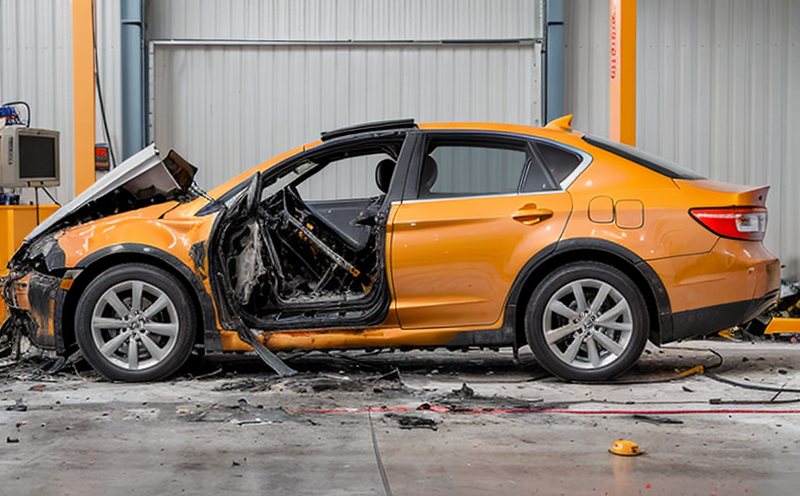IEEE 1725 Mechanical Abuse Testing of Rechargeable Batteries for Mobile Phones
The IEEE Standard IEEE 1725-2023, titled "Standard Test Method for Determining the Ability of Lithium-Ion and Lithium-Polymer Cells to Withstand Mechanical Abuse," provides a comprehensive framework for testing the mechanical resilience of rechargeable batteries used in mobile phones. This standard is crucial for ensuring that these batteries can withstand potential environmental stresses during manufacturing, transportation, and use.
The test method outlined in IEEE 1725 is designed to simulate real-world conditions where batteries may be subjected to physical abuse such as impact, puncture, crushing, or over-temperature conditions. The standard specifies detailed protocols for preparing the specimen, conducting the tests, and evaluating the results. Compliance with this standard ensures that mobile phone manufacturers can deliver products that are robust and reliable, thereby enhancing user safety.
Understanding the test parameters is essential to ensure accurate and consistent testing outcomes. For instance, the impact test involves dropping a battery from a specified height onto a steel plate, while the puncture test requires applying increasing pressure until penetration occurs. Each test has specific acceptance criteria that must be met for the battery to pass the standard.
Specimen preparation is also critical in IEEE 1725 testing. The batteries undergo various pre-test treatments such as conditioning and conditioning at different temperatures, which ensures they are in a stable state before the tests begin. This step helps in achieving consistent results across multiple test runs.
The instrumentation used for these tests includes impact testers, puncture machines, environmental chambers, and data acquisition systems. These instruments ensure that each test is conducted under controlled conditions and that the data collected can be accurately analyzed to determine compliance with IEEE 1725 standards.
Compliance reporting is another key aspect of this standard. The report should detail all aspects of the testing process, including pre-test conditioning, test parameters, instrumentation used, results, and any deviations from the standard procedure. This comprehensive documentation ensures that manufacturers can demonstrate their compliance with IEEE 1725 to regulatory bodies and customers.
Understanding how this standard impacts various stakeholders is also important. Quality managers rely on these tests to ensure product quality meets safety standards. Compliance officers use this information to audit suppliers and manufacturing processes, ensuring adherence to industry regulations. R&D engineers leverage this data for continuous improvement of battery designs and materials. Procurement teams can use the results from IEEE 1725 testing as a procurement criterion to select reliable suppliers.
The standard is applicable not only to lithium-ion and lithium-polymer batteries but also to similar technologies used in other portable electronic devices, making it a versatile tool for ensuring product safety across various sectors.
Applied Standards
| Standard | Description |
|---|---|
| IEEE 1725-2023 | Standard Test Method for Determining the Ability of Lithium-Ion and Lithium-Polymer Cells to Withstand Mechanical Abuse |
| ISO/IEC 8846:2019 | Electrochemical energy storage systems - Safety requirements |
| ASTM G37-18 | Standard Test Method for Determining the Ability of Batteries to Withstand Mechanical Abuse by Puncture |
Industry Applications
- Battery manufacturers and suppliers
- Mobile phone manufacturers and OEMs
- Regulatory bodies ensuring product safety
- R&D teams focusing on improving battery durability
- Insurance companies assessing risk associated with electronic devices
| Industry Application | Description |
|---|---|
| Battery Testing Laboratories | Conducting mechanical abuse tests to ensure compliance with IEEE 1725 standards. |
| OEMs and Makers of Portable Electronics | Evaluating battery performance under abusive conditions to enhance product reliability. |
| Insurance Companies | Assessing the risk associated with electronic devices in insurance claims. |
Eurolab Advantages
At Eurolab, our commitment to excellence ensures that we provide top-tier mechanical abuse testing services tailored to the IEEE 1725 standard. Our state-of-the-art facilities are equipped with advanced instrumentation and experienced technicians who ensure accurate, consistent, and reliable test results.
- Compliance with international standards
- Expertise in handling sensitive materials
- Robust quality control processes
- Accurate data analysis for actionable insights
We pride ourselves on offering a comprehensive range of services that cater to the needs of our clients. From initial consultation to final report, we ensure every step of the testing process is conducted with precision and professionalism.





